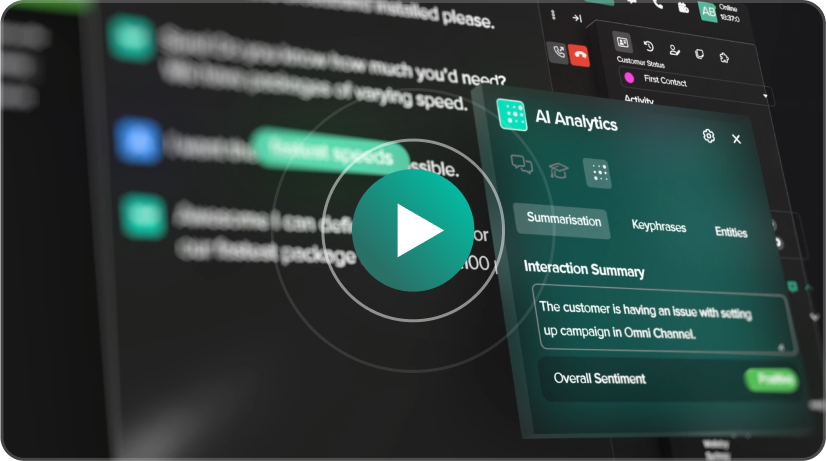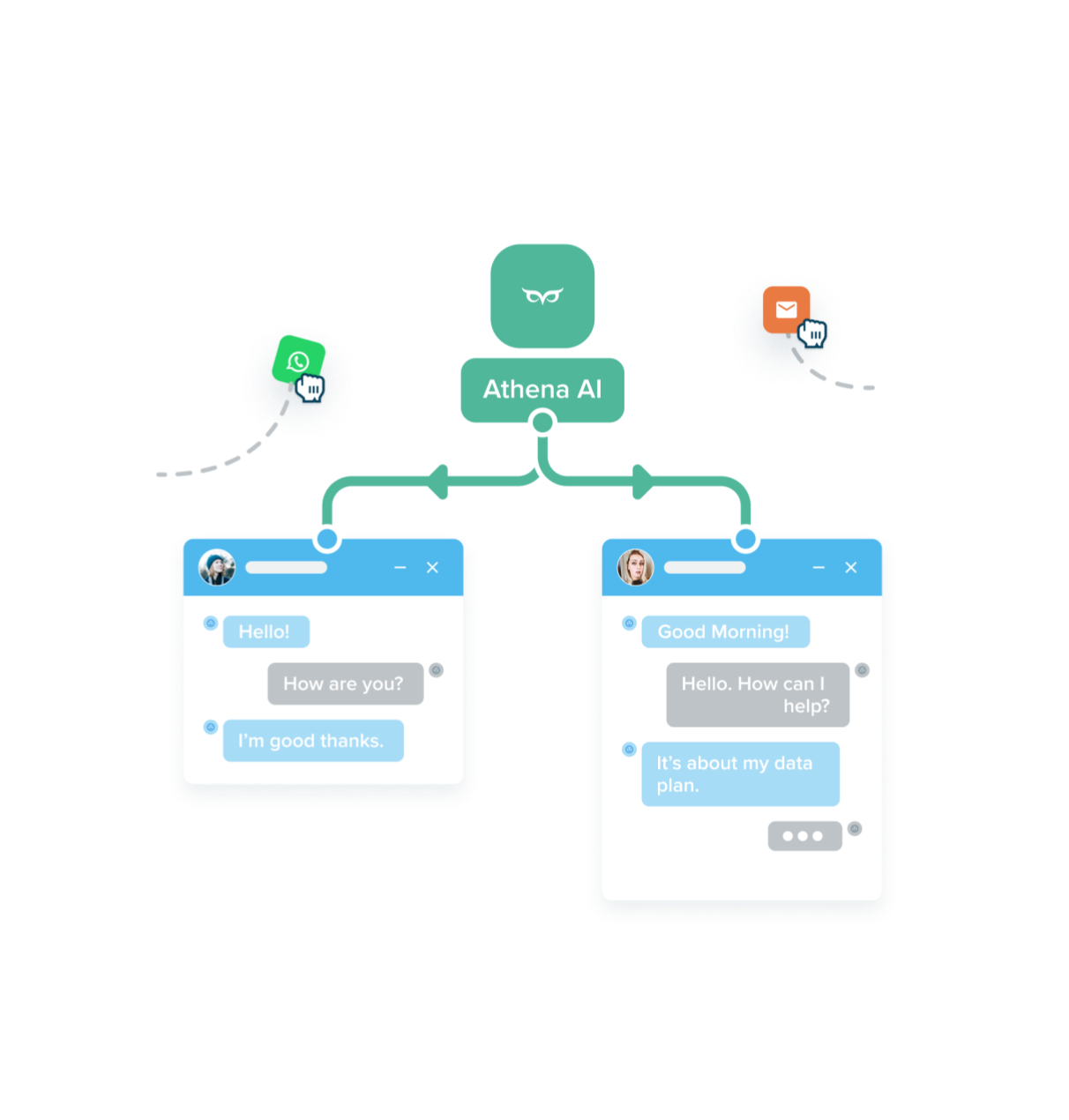Call Center IVR
If you’ve ever reached out to customer support, you’ve likely encountered a Call Center IVR system, or Interactive Voice Response system, offering choices like “To speak with a representative, press 1; for account inquiries, press 2; to explore our product offerings, press 3; for technical assistance, press 4…” Call Center IVR routes calls based on customer input, using automated menus to connect them to self-service options or agents. Previously, manual call directing caused long wait times and frustration. IVR systems now streamline this process, helping customers find assistance more efficiently.
This technology, a longstanding staple in customer service, remains indispensable today, aiding support teams in providing efficient and budget-friendly phone assistance. But today, there are many more options than traditional IVRs. The advent of Artificial Intelligence and its widespread implementation across customer service and customer engagement operations has also extended to the Call Center IVR system, especially in the form of ASR (Automatic Speech Recognition) functionalities.
ASR Call Center IVR Systems offer a quantum leap in efficiency compared to traditional IVRs, revolutionizing call center operations with their capability of streamlining call processes and boosting customer engagement efficiencies.
In this article, we’ll talk about the mechanics of Call Center IVR Systems, their essential role in enhancing customer experiences over the phone, and everything that intelligent ASR IVR systems can offer to take customer engagement operations to the next level.
Let’s start with a definition. What exactly is a Call Center IVR?
What is a Call Center IVR?
Call Center IVR is the technology enabling call centers to direct calls based on customers’ spoken responses or touch-tone input. These systems employ automated menus to classify inbound callers and link them to self-service options or call center agents.
In legacy call centers, agents manually directed incoming calls, resulting in extended wait times and queues that were sources of frustration for both customers and businesses. IVR systems contributed to alleviate these issues by replacing the traditional switchboard operator with an automated call routing process, empowering customers to navigate themselves to the assistance they require.
As you probably know, traditional call center IVRs rely primarily on touch-tone input from callers. They present users with a series of pre-recorded menu options, prompting them to select a number corresponding to their desired action or department. However, ASR IVRs integrated with modern Call Center Software solutions are much more advanced.
ASR IVRs, based on Automatic Speech Recognition Artificial Intelligence, incorporate advanced technology that allows them to interpret and understand spoken language from callers. Instead of relying solely on touch-tone input, ASR IVRs can recognize and process natural language, enabling callers to speak their responses or requests instead of navigating through menus. This provides a more intuitive and efficient experience for callers, as they can communicate naturally rather than having to follow a structured menu system. But that’s not all.
ASR IVRs can also allow for a greater level of detail and personalization in how a call center addresses customer queries. Implementing other Artificial Intelligence features into a Call Center IVR system, like Keyphrase or Entity Recognition, can help your call center sort their queries better, faster, and more efficiently, making sure every question gets the right response at the right time. More on this later.
In the following section, we’ll explain some of the most important benefits of Call Center IVR systems, especially those equipped with AI capabilities. Let’s get to it.
Benefits of a Call Center IVR
Cost-Effective
A proficiently implemented IVR (Interactive Voice Response) system holds the potential to significantly augment the cost-effectiveness of contact center operations, thereby bolstering business revenue. By automating call handling processes and intelligently routing inquiries, IVR systems minimize the need for manual intervention, reducing operational costs associated with staffing and resource allocation.
Moreover, IVR automation expedites lead conversion by swiftly directing qualified leads to the sales team, ensuring timely follow-up and personalized engagement. This proactive approach not only accelerates the sales cycle but also enhances customer satisfaction by providing prompt assistance and relevant information. Overall, a well-executed IVR system serves as a strategic tool for businesses, optimizing operational efficiency and driving revenue growth through streamlined customer interactions and targeted lead management.
Scalable and Easy to Implement
IVR-enabled contact centers offer enhanced scalability and flexibility compared to traditional call centers, thanks to their agile cloud-based solutions. With such systems, you can swiftly create and update IVR menus and workflows to adapt to changing needs. Moreover, you don’t need coding expertise to kickstart the process. This ease of customization empowers businesses to respond promptly to market demands and customer preferences, ensuring a seamless and dynamic customer experience. Additionally, cloud-based IVR solutions offer built-in redundancy and disaster recovery capabilities, minimizing downtime and ensuring uninterrupted service delivery even during unforeseen circumstances.
Access to Data and Analytics
Software-based solutions like IVR provide comprehensive insights into call data and contact center metrics, such as customer satisfaction scores, call abandonment rates, and service level agreement adherence, all accessible from a unified dashboard. This data serves as a vital tool for evaluating contact center performance and agent efficiency. Additionally, integrating IVR with your omnichannel contact center allows agents to swiftly access customer data, enabling them to provide personalized and efficient service tailored to each caller’s needs.
24/7 Support
Continuous support is a vital element of excellent customer service, yet not all businesses can afford to provide live assistance round-the-clock. This is where a Call Center IVR system proves invaluable. Utilizing pre-recorded responses, IVR efficiently addresses frequently asked questions without burdening support agents or necessitating additional staffing. This becomes particularly beneficial during holidays, emergencies, peak hours, and product launches. By ensuring 24/7 availability, you keep your customers informed and alleviate frustration during times when live agents may not be accessible.
In the next section, we’ll explore ASR IVR systems as the more advanced and promising type of IVR for Contact Centers. As we have mentioned earlier, ASR IVRs implement Artificial Intelligence in the form of ASR, or Automatic Speech Recognition features. Let’s see why ASR IVRs are such a valuable technological resource in the fast-paced customer service landscape.
ASR IVR Systems
Interactive Voice Response (IVR) systems leveraging Automatic Speech Recognition (ASR), and Natural Language Processing (NLP) represent a technological advancement in customer service interactions. By employing sophisticated algorithms, they are able to understand customers when they verbally express themselves about their queries, their problems, or what they might need help with. But that’s not all.
When integrated with other Artificial Intelligence and automation features, like Keyphrase Analysis implemented within automated call routing, IVR menus can also address them on the spot or tell what they’re about, sort them, and direct them to the right agent. But how does this work? Let’s take a look at it.
ASR IVRs are capable of comprehending and responding to spoken language from callers. When a caller initiates contact with the ASR IVR system, they are prompted to engage verbally, providing responses or queries in their own words. The ASR component of the IVR system then springs into action, converting the spoken words into digital text through complex linguistic analyses.
Once the speech has been transcribed, Artificial Intelligence Natural Language Processing (NLP) techniques are employed to further understand the meaning and intent behind the words spoken by the caller. This involves parsing the text, identifying key phrases, and deciphering the underlying purpose of the interaction. Based on this comprehension, the IVR system proceeds to route the call appropriately, offering relevant information, executing specific actions, or directing the caller to the appropriate department or agent.
The integration of ASR and NLP technologies allows for a more intuitive and natural interaction between callers and the IVR system, eliminating the need for rigid menu-driven interfaces. Moreover, ASR IVRs continuously learn and adapt through machine learning algorithms, improving their accuracy and efficiency over time.
This automation streamlines operational workflows, enabling human agents to focus their expertise on more complex and high-value interactions. The prompt, accurate, and personalized responses delivered by AI IVRs significantly enhance customer satisfaction levels, fostering greater loyalty and driving improved business outcomes.
If you enjoyed reading this, you might also be interested in…
Call Center IVR
Customer Interaction Management
Contact Center Artificial Intelligence
Customer Service AI
Conversational AI
Contact Center Artificial Intelligence
AI Agent
Omnichannel
Omnichannel Contact Center
CCaaS


